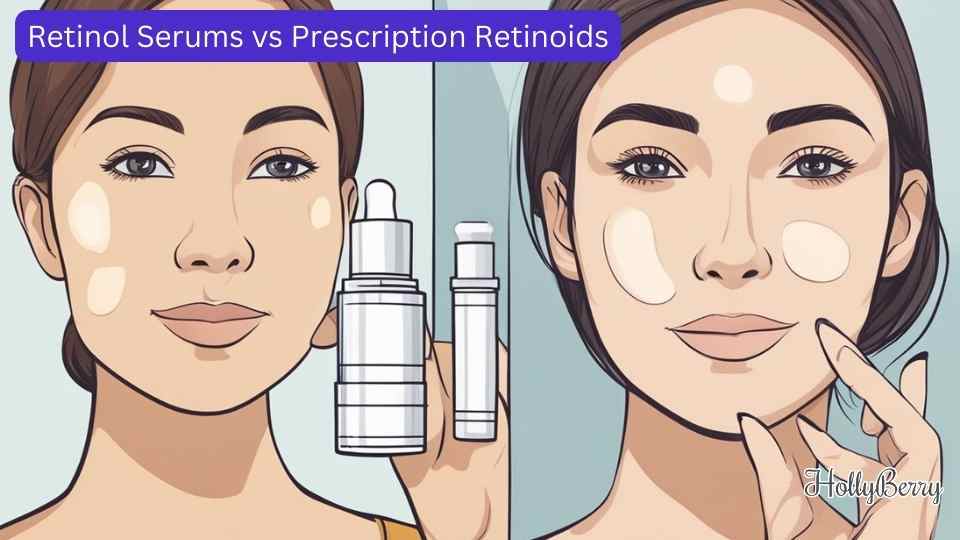
Retinol Serums vs Prescription Retinoids
Share
A Comprehensive Comparison
Retinol serums and prescription retinoids are two popular skincare ingredients that are often compared to each other.
Both are derivatives of vitamin A and are known for their anti-aging properties. However, there are some key differences between the two that are important to understand before deciding which one to use.

Order our Retinol serum from our UK store here
Retinol is a milder form of vitamin A that is available over the counter in various skincare products, including serums, creams, and lotions.
It is often used to reduce the appearance of fine lines, wrinkles, and dark spots, as well as to improve skin texture and tone.
On the other hand, prescription retinoids are stronger and more potent versions of vitamin A that are available only with a doctor's prescription.
They are typically used to treat more severe skin conditions, such as acne and psoriasis, and are known for their ability to speed up cell turnover and increase collagen production.
When deciding between retinol serums and prescription retinoids, it's important to consider your skin type and concerns, as well as your budget and lifestyle.
While retinol is generally considered safe for most skin types, prescription retinoids can cause more irritation and dryness, especially in the beginning stages of use.
Additionally, prescription retinoids can be more expensive and require regular visits to a dermatologist.
Overall, both retinol serums and prescription retinoids have their benefits and drawbacks, and the choice ultimately comes down to personal preference and skincare goals.
Understanding Retinol and Retinoids
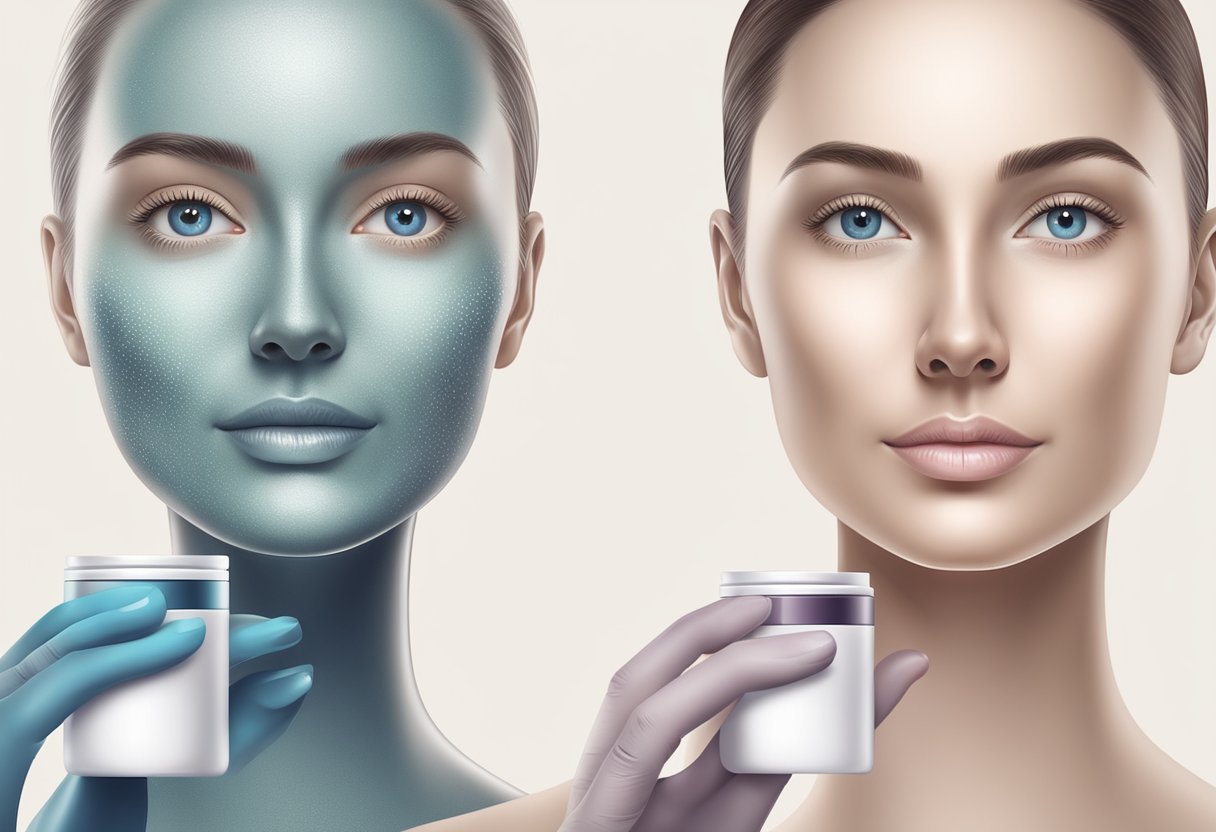
Retinol and retinoids are both derivatives of vitamin A. They are commonly used in skincare products to treat a variety of skin concerns such as acne, fine lines, wrinkles, and hyperpigmentation.
Retinol is a weaker form of vitamin A that is available over-the-counter. It is converted into retinaldehyde and then into retinoic acid, which is the active form of vitamin A in the skin.
Retinoids, on the other hand, are a stronger form of vitamin A that are available only by prescription. They are already in the active form of retinoic acid and do not need to be converted in the skin.
The molecular structure of retinol and retinoids is different. Retinol has a long hydrocarbon chain, while retinoids have a shorter chain.
This difference in structure affects the way they are absorbed and metabolized by the skin.
Retinoic acid is the most potent form of vitamin A and is responsible for most of the benefits of retinoids.
Retinoids can be highly effective in treating acne and reducing the appearance of fine lines and wrinkles. However, they can also cause irritation and dryness, especially when first starting to use them.
Retinol, on the other hand, is less irritating than retinoids. It is a good option for those with sensitive skin or for those who are new to using vitamin A products.
However, it may take longer to see results with retinol compared to retinoids.
There are different ester forms of vitamin A, such as retinyl palmitate, retinyl linoleate, and retinyl acetate. These ester forms are less effective than retinol and retinoids because they need to be converted into retinoic acid in the skin.
In summary, retinol and retinoids are both derivatives of vitamin A that can be used to treat a variety of skin concerns.
Retinoids are stronger and more effective, but can also cause more irritation and dryness. Retinol is a good option for those with sensitive skin or for beginners, but may take longer to see results.
Role in Skincare

Retinol serums and prescription retinoids both play a significant role in skincare. They are both derivatives of vitamin A, which is known to accelerate skin cell turnover and increase collagen and elastin production.
Retinol serums are available over the counter and are generally weaker than prescription retinoids.
They are a popular choice for those who want to improve their skin texture, tone, and reduce the appearance of fine lines and wrinkles. Retinol serums are also effective in treating acne, acne scars, and hyperpigmentation.
On the other hand, prescription retinoids are stronger and can only be obtained with a prescription from a dermatologist.
They are typically used to treat severe acne, sun damage, and signs of aging. Prescription retinoids are known to unclog pores, reduce the appearance of fine lines and wrinkles, and improve skin texture and tone.
Both retinol serums and prescription retinoids can cause skin irritation, especially when first starting to use them.
It is recommended to start with a small amount, apply a moisturizer, and gradually increase usage. It is also important to use sunscreen daily as retinol and retinoids can make the skin more sensitive to the sun.
In summary, retinol serums and prescription retinoids are valuable tools in skincare.
While retinol serums are a great choice for those looking to improve their skin texture and reduce the appearance of fine lines and wrinkles, prescription retinoids are more suitable for those with severe acne, sun damage, and signs of aging.
Retinol Serums
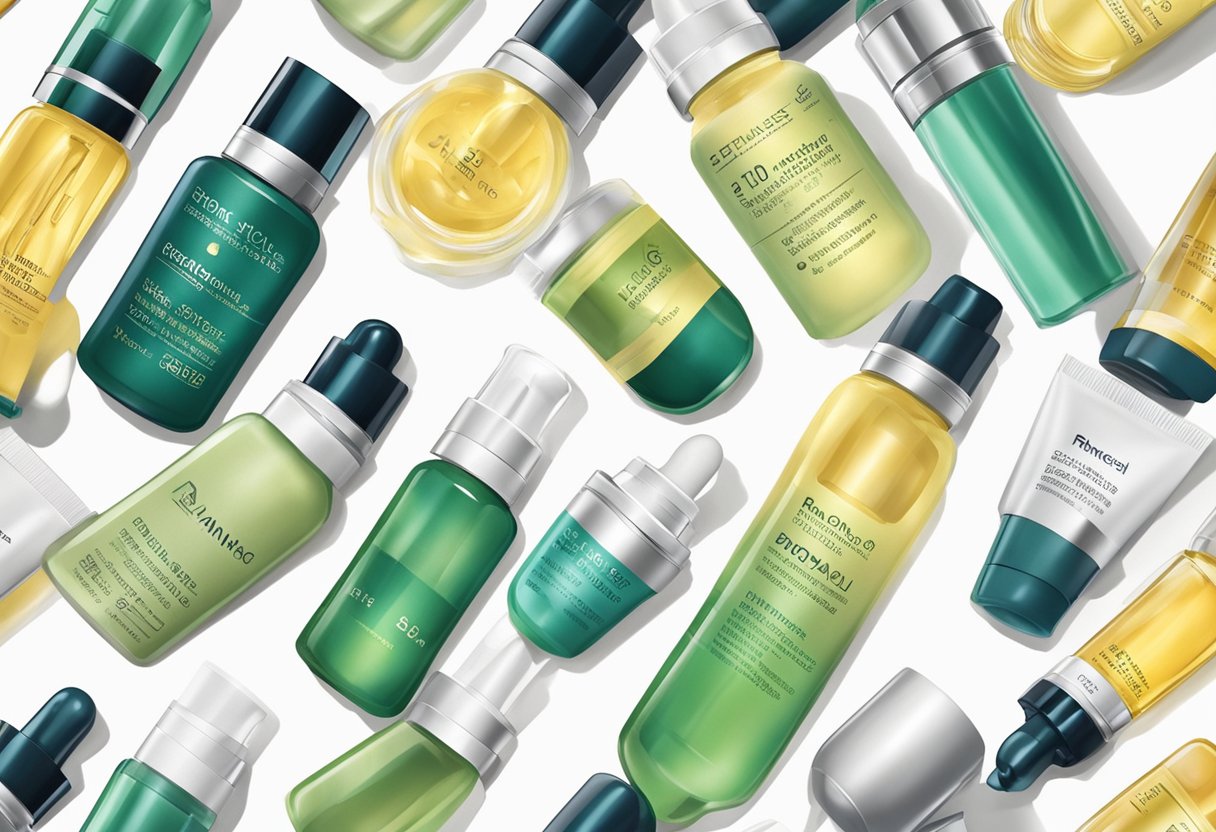
Retinol serums are a popular over-the-counter skincare product that contains a milder form of Vitamin A, which is known to have anti-aging benefits.
Retinol serums are a popular choice for those who want to incorporate a retinoid into their skincare routine without a prescription.
Retinol serums are hydrating and can help to improve the overall texture and appearance of the skin.
They can also help to reduce the appearance of fine lines, wrinkles, and hyperpigmentation. However, it is important to note that over-the-counter retinol serums may not be as effective as prescription retinoids.
When using a retinol serum, it is important to start with a low concentration and gradually increase the strength as the skin becomes more tolerant. It is also important to use a gentle cleanser, moisturizer, and sunscreen with at least SPF 30 to protect the skin from sun sensitivity.
Niacinamide, benzoyl peroxide, and witch hazel are some ingredients that can be used in conjunction with retinol serums to help hydrate and soothe the skin. It is important to avoid harsh exfoliants and other active ingredients that can irritate the skin when using retinol serums.
Overall, retinol serums can be a great addition to a skincare routine for those looking to improve the appearance of their skin.
However, it is important to remember that they may not be as effective as prescription retinoids and to use them in conjunction with other hydrating and gentle skincare products.
Prescription Retinoids

Prescription retinoids are a group of vitamin A derivatives that are stronger than over-the-counter retinol products.
They are available only with a prescription from a medical professional, such as a dermatologist. Prescription-strength retinoids are used to treat a variety of skin conditions, including acne, psoriasis, and signs of aging.
There are three main types of prescription retinoids: tretinoin, adapalene, and tazarotene.
Tretinoin, also known as Retin-A, is the most commonly prescribed retinoid. It is used to treat acne, as well as fine lines, wrinkles, and hyperpigmentation.
Adapalene, sold under the brand name Differin, is also used to treat acne. Tazarotene, sold under the brand name Tazorac, is used to treat acne and psoriasis.
Isotretinoin is another prescription-strength retinoid that is used to treat severe acne. It is usually taken orally, rather than applied topically like other retinoids.
Isotretinoin is a powerful medication that can have serious side effects, so it is only prescribed for severe cases of acne that have not responded to other treatments.
Epiduo is a combination of adapalene and benzoyl peroxide, which is also used to treat acne. It is available only with a prescription from a healthcare provider.
Prescription-strength retinoids can be very effective, but they can also cause side effects such as redness, peeling, and dryness. It is important to follow the instructions of your healthcare provider when using prescription retinoids, and to use them only as directed.
References:
Considerations for Use
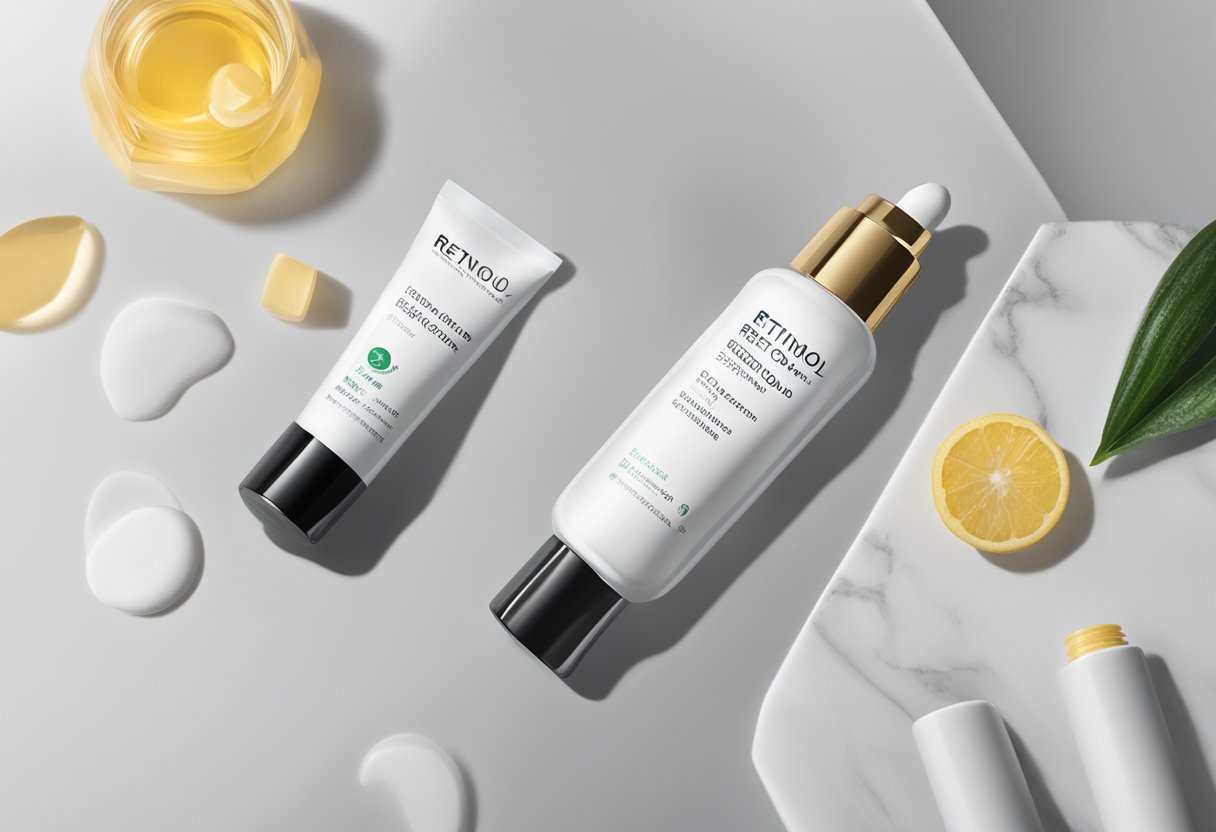
When using retinol serums or prescription retinoids, there are several considerations to keep in mind. It is important to consult with a dermatologist to determine the best option for your skin type and concerns.
Individuals with sensitive skin may experience inflammation, irritation, dryness, redness, peeling, flaking, or burning when using retinoids.
Those with dry skin may also experience increased dryness, while those with oily skin may experience increased oil production.
Mature skin may benefit from the use of retinoids, as they can help to reduce the appearance of fine lines and wrinkles. However, it is important to start with a low concentration and gradually increase to avoid irritation.
It is important to use retinoids as directed and to avoid using them with other potentially irritating products, such as exfoliants or benzoyl peroxide. Sun protection is also essential, as retinoids can increase sensitivity to the sun.
Individuals with a history of eczema or rosacea may need to avoid retinoids altogether, as they can exacerbate these conditions.
Overall, the use of retinol serums and prescription retinoids can be beneficial for many individuals. However, it is important to carefully consider individual factors and to use these products with caution to avoid irritation and other side effects.
Special Cases
When it comes to using retinol serums or prescription retinoids, there are some special cases to consider.
Pregnancy
Pregnant women should be cautious when using retinol or prescription retinoids. While there is no concrete evidence that these products are harmful to a developing fetus, it is still recommended that pregnant women avoid using them.
It is best to consult with a doctor before using any retinoid product during pregnancy.
Breastfeeding
Retinol and prescription retinoids are not recommended for use while breastfeeding. These products can be absorbed through the skin and potentially passed on to the baby through breast milk.
It is recommended that breastfeeding women avoid using any retinoid product while breastfeeding.
Sensitive Skin
Individuals with sensitive skin may experience more side effects when using retinol or prescription retinoids. It is important to start with a lower concentration of the product and gradually increase as tolerated. It is also recommended to use a moisturizer to help reduce any potential irritation.
Acne
Both retinol and prescription retinoids can be effective in treating acne. However, prescription retinoids are generally more potent and may be more effective for severe cases of acne.
It is important to consult with a dermatologist to determine the best treatment plan for acne.
Anti-Aging
Retinol and prescription retinoids are both effective in reducing the appearance of fine lines and wrinkles. However, prescription retinoids may provide faster and more dramatic results. It is important to consult with a dermatologist to determine the best treatment plan for anti-aging concerns.
Conclusion
When it comes to using retinol serums vs. prescription retinoids, there are some special cases to consider. It is important to consult with a doctor or dermatologist before using any retinoid product during pregnancy or while breastfeeding.
Individuals with sensitive skin should start with a lower concentration of the product and gradually increase as tolerated. For acne and anti-aging concerns, it is recommended to consult with a dermatologist to determine the best treatment plan.
Building a Skincare Routine
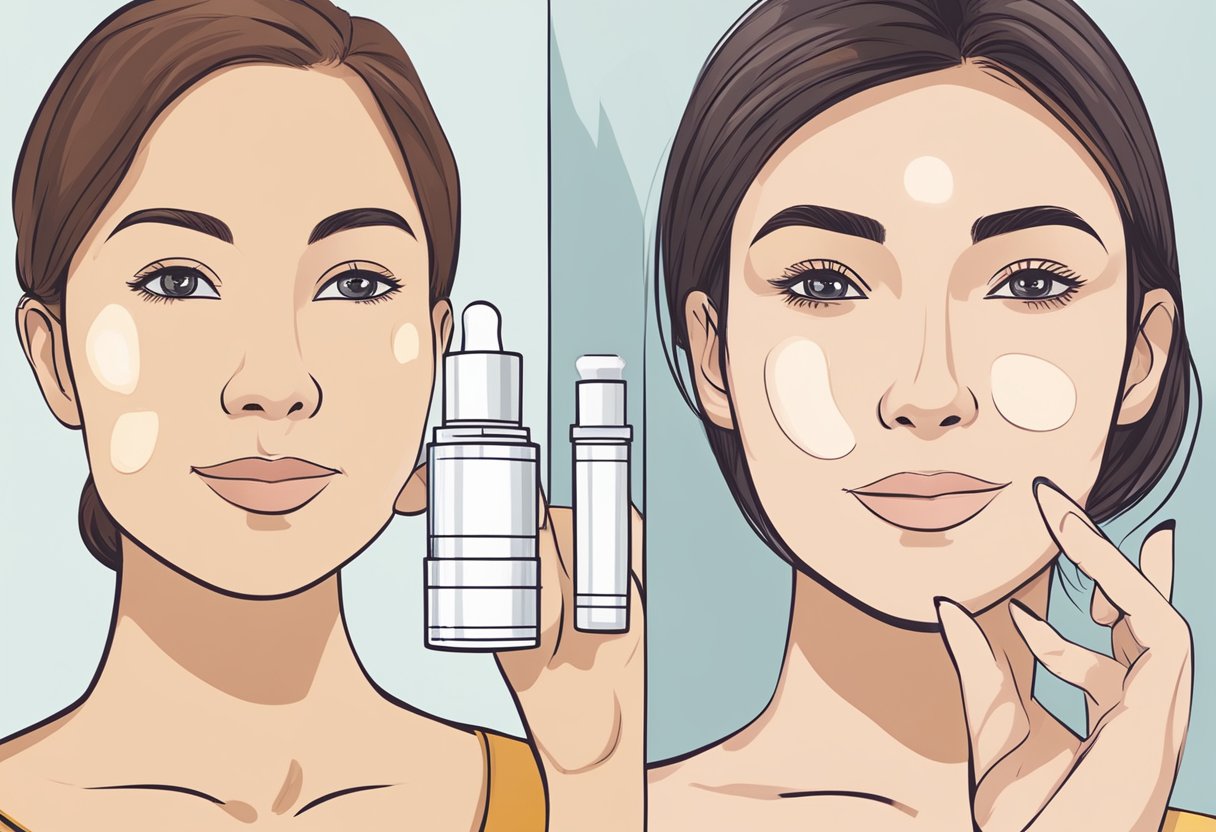
Building a skincare routine can be overwhelming, especially when trying to incorporate retinol serums or prescription retinoids.
However, it is important to remember that consistency is key when it comes to skincare.
When incorporating retinol serums or prescription retinoids into a skincare routine, it is important to start slow and gradually increase usage.
This will help prevent any potential irritation or sensitivity. It is also recommended to use retinol products at night, as they can make the skin more sensitive to sunlight.
For those with psoriasis or other skin conditions, it is important to consult with a dermatologist before incorporating retinol serums or prescription retinoids into a skincare routine. These products can potentially exacerbate certain skin conditions.
When it comes to results, both retinol serums and prescription retinoids can provide significant improvements in the appearance of fine lines, wrinkles, and uneven skin tone. However, prescription retinoids tend to be more potent and can provide more dramatic results.
In terms of application, retinol serums are typically applied after cleansing and toning, and before moisturizing.
Prescription retinoids can come in the form of creams or gels and are applied in a similar manner. Some popular prescription retinoid brands include Murad and La Roche-Posay.
It is also important to note that retinol serums and prescription retinoids can have firming effects on the skin, helping to improve overall skin texture and elasticity.
Overall, incorporating retinol serums or prescription retinoids into a skincare routine can provide significant benefits for the skin. However, it is important to start slow, consult with a dermatologist if necessary, and be consistent with usage to see the best results.
